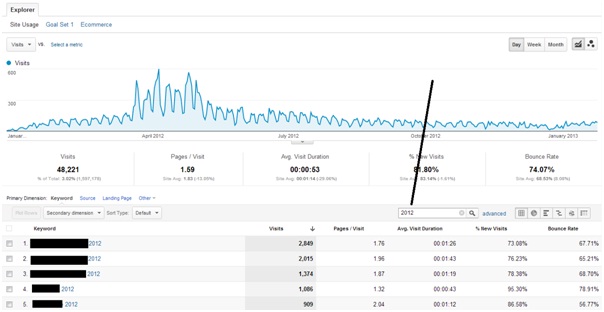4 Under The Radar Keyword Research Sources You Can Use To Find Hidden Gems
If you are using the same tools and techniques as your competitors, you’ll end up competing on the same keywords, resulting in an ongoing SEO battle that will drain your resources in this zero sum game. This article will outline a number of tools and techniques that I have used to go above and beyond […]
If you are using the same tools and techniques as your competitors, you’ll end up competing on the same keywords, resulting in an ongoing SEO battle that will drain your resources in this zero sum game. This article will outline a number of tools and techniques that I have used to go above and beyond conventional keyword research to find ‘hidden gems’ with low competition and high volume.
1. Wikipedia
How many times have you found a promising keyword only to discover a Wikipedia page ranking first in Google? The prospect of having to outrank Wikipedia used to be daunting, but after discovering this technique, it’s more of a bittersweet occurrence.
If you wanted to rank organically for the expensive keyword [structured settlement], you may notice the following Wikipedia page ranking first in Google for the keyword:
 This tool will allow you to find the traffic volume for any Wikipedia page over the last 90 days. The resulting data can help you determine, whether it is worth the effort, to try and outrank the Wikipedia page.
This tool will allow you to find the traffic volume for any Wikipedia page over the last 90 days. The resulting data can help you determine, whether it is worth the effort, to try and outrank the Wikipedia page.
2. Government Website Keyword Data
If it’s not a Wikipedia page that’s outranking me, it’s invariably a government website. As a tax payer, you effectively own a share in your government’s websites. Governments are coming under more pressure to improve transparency and, as a result, are making vast amounts of data available to the public.
Would you not be interested in knowing the keywords, referring sites, and most popular pages of a website that you help to fund?
The UK government already shares the data for one of the UK’s most popular website, DirectGov:
It’s quite interesting to sneak a peek behind the curtain and see the keywords which this popular website is ranking for, but on a more practical level, the data can be used for:
- Targeting keywords in your niche
- Checking the accuracy of keyword tools
- Creating content or a mini site based on the most popular pages
- Using the referral data for link building opportunities
If a government is not publicly sharing data for a particular website, you may be able to use Freedom of Information legislation to request it. It usually involves just sending an email to the site administrator. I have used Freedom of Information legislation to request keyword and referral data from the following UK websites:
- Justice.gov.uk
- Office of National Statistics
- Department of Work and Pensions
- Home Office
- Inland Revenue
- Department of Transport
The resulting information contained a goldmine of keyword data for the legal, finance and auto niches.
3. Most Popular Posts Of [Insert Year]
At the end of the year, many websites, including Search Engine Land, highlight their most popular posts. To find posts that have proved popular in your niche, you can use Google and a query such as:
[your niche]+most popular posts of 2012+traffic
If you were in the legal niche and looking for new keyword and content ideas, you could use a query such as:
If you click on the highlighted post, the author mentions that during the year, they wrote 50 articles and had over 100,000 visitors. Using the Pareto principle (the 80/20 rule), we can estimate that the 10 articles listed received around 80,000 visitors.
If I were working as an SEO for a law firm, I would see this as a great opportunity to create some ‘how to’ content on topics such as:
- How to look up criminal records
- How to conduct a background check
- How much does it cost to find a person
You could also do back link analysis to see which of these posts received links and then perform outreach to the sites that linked to your competitor after you have created even better content.
4. [Keyword] + 2013
Google’s Keyword tool only provides historical keyword data. It does not account for what people will be searching for in the future.
You can pre-empt which keywords will be popular in the forthcoming year by using your Google analytics data from the previous year. By searching for [2012], it is possible to find year-specific keywords, which you can target for the coming year before these search terms are reflected in the keyword tool:
This will give you a head start on the competition, allowing you to be one of the first sites to have content and links for these soon-to-be popular keywords. Your content will also have more chance of acquiring links, as people who are searching for your time-relevant content, will be more likely to reference it.
If your site did not rank for any year-specific keywords, an alternative method would be to use your AdWords data or target your most popular keywords adding the [year] parameter. For example, if one of your popular keywords was [tax return], you could target [tax return 2014].
Tip: I have used the above technique, together with buying the exact match domain for the keyword, such as [keyword2014.com], to create some very high traffic mini sites.
The tools and techniques listed above are not a replacement for other keyword tools. They help to give a clearer picture and a head start on your competition. Let me know about any creative keyword tools or hacks you use in the comments.
Contributing authors are invited to create content for Search Engine Land and are chosen for their expertise and contribution to the search community. Our contributors work under the oversight of the editorial staff and contributions are checked for quality and relevance to our readers. The opinions they express are their own.
Related stories



